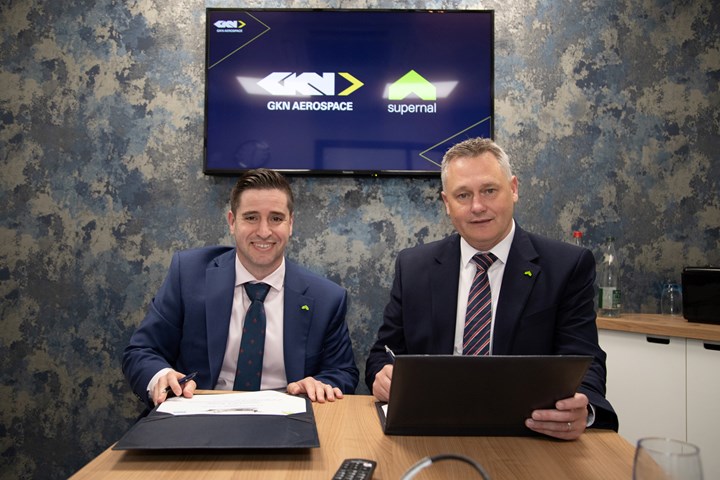GKN Aerospace to provide aerospace expertise for Supernal eVTOL vehicle
GKN’s supply of lightweight aerostructures, EWIS and maturation of high-rate manufacturing technologies will lay the foundation for scaled AAM manufacturing.
Supernal LLC (Washington, D.C., U.S.) and GKN Aerospace (Redditch, U.K.) have announced a partnership on the design and build of major aerostructures and electrical wiring interconnection system (EWIS) for Supernal’s electric vertical takeoff and landing (eVTOL) vehicle, a concept of which was showcased in July 2022. In addition, the companies will also mature high-rate manufacturing technologies to produce these parts and assembly methods. This marks the second established aerospace manufacturer agreement Supernal has announced at this year’s Paris Air Show.
GKN will work with Supernal to apply its broad portfolio of design capabilities and manufacturing technologies to the development of the company’s eVTOL vehicle. GKN will supply lightweight aerostructures — while specific materials are not mentioned in the original release, GKN’s status as a Tier 1 aerospace supplier of lightweight composites suggests their probable use — and high-voltage, high-power electrical wiring systems for Supernal’s full-scale technology demonstrator, which it will begin flying in 2024.
The partnership aims to improve the business case — and process — for introducing advanced materials and rate-enabling assembly processes to the AAM industry. In working with GKN to mature these innovative processes from the outset, Supernal expects to develop volume ramp-up capabilities that enable the company to rapidly scale production as aircraft order demand grows.
“Manufacturing is crucial to the success of AAM and Supernal is pleased to partner with leading suppliers, such as GKN Aerospace, to industrialize existing processes,” Jaiwon Shin, president of Hyundai Motor Group (HMG, Seoul, South Korea) and CEO of Supernal, says. “Instead of focusing on ‘time to market,’ Supernal is prioritizing ‘time to scale.’ Our work with GKN Aerospace will lay the foundation for producing eVTOL vehicles at scale and will be bolstered by Hyundai Motor Group’s high-tech manufacturing processes.”
As part of HMG, Supernal is working to integrate the automotive company’s expertise — including supply chain management, logistics and distribution and manufacturing — throughout the AAM ecosystem. In the manufacturing realm, HMG is helping Supernal to develop a scalable digital factory model that will industrialize aerospace material and assembly advancements. Supernal’s work with aerospace manufacturers, such as GKN Aerospace, is an important first step toward the company’s ability to reduce the cost and time of aircraft production.
Supernal and GKN Aerospace’s design and manufacturing activities have begun at GKN Aerospace’s Global Technology Centre in Bristol and across sites in Europe.
“We are excited to collaborate with Supernal and to support the development of this all-new eVTOL,” John Pritchard, president, civil airframes, GKN Aerospace, adds. “Supernal’s eVTOL can play a key role in the transition to zero-emissions flight, and we are delighted to be collaborating on the platform, in line with our mission to be the most trusted and sustainable partner in the sky.”
Supernal’s partnership with GKN Aerospace is part of the company’s “open ecosystem” approach to address the niche technology needs of AAM. The company plans to grow its portfolio of manufacturing partners across other vehicle components and assemblies, in addition to airframe.
Related Content
-
Composites end markets: Automotive (2024)
Recent trends in automotive composites include new materials and developments for battery electric vehicles, hydrogen fuel cell technologies, and recycled and bio-based materials.
-
Lilium launches M&A process, targets eVTOL program continuation
Despite court-approved insolvency filings and beginning first investor briefings, Lilium remains fully focused on re-emerging following restructuring, setting its sights on fresh investment to support the Lilium Jet.
-
Plant tour: Joby Aviation, Marina, Calif., U.S.
As the advanced air mobility market begins to take shape, market leader Joby Aviation works to industrialize composites manufacturing for its first-generation, composites-intensive, all-electric air taxi.
















